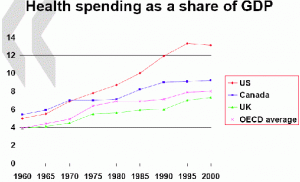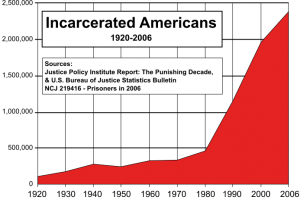To paraphrase many of the greatest religious and moral leaders, there is only one law: imagine you are in someone else’s shoes, then treat them as you would wish to be treated.
Or, put another way, act towards everyone as if you loved them.
The vast majority of political and economic commentary on this blog is commentary derived from those postulates. Note that they are postulates, they are judgments about how you should live. I can make a very strong argument that the more a society acts like this, the more everyone is happy, including the rich and powerful, but that’s not why you should act that way, as powerful arguments can be made for selfish and destructive self-interest. You should act that way because it’s the right thing to do, and you know it is, deep in your gut.
The problem in this sort of thinking comes with people who insist on acting selfish in ways that harms too many other people. You can try the Martin Luther King, Jesus, Buddha or Gandhi approach with them: love them. Try and help them. And you should. But sometimes that fails, as with Gandhi’s attempts with Hitler.
Then comes the time when force must be met with force, and evil met with evil. And the question then is how not to become that which you fight, how to, in Christopher Dawson’s words, “not become indistinguishable from the evil (you) fight”.
It’s a hard question, and it’s one that many people have struggled with. King acknowledged that the instinct to strike back violently was natural and he even acknowledged that not striking back had a psychological cost. Acting with love was medicine for the sickness of the white racist soul, and it had a cost for those who practiced it. He also acknowledged that if non-violence didn’t work, violence was better than acceptance.
I will submit that the answer lies in red lines. In actions you WILL NOT take no matter what. No torture, for example. No rape. No deliberate degradation of other people. When I hear those who believe in the greater good who want to torture other people, think prison rape is just or who like the idea of making other people crawl and beg, I know they have stared into the abyss too long. They aren’t necessarily indistinguishable from the evil they fight, but they are walking that path.
At the same time, an insistence on complete moral purity is a road to evil of another kind, it is the road that leads to a man like Robespierre. And a strange part of the route to this evil is a refusal to accept petty human failings (like adultery, for example). A refusal to see that a person who has once done wrong, may still do much good. A refusal to believe that those who have done evil, can be redeemed.
I will submit that what must not be tolerated is people who allow themselves to take pleasure in the pain or degradation of other people. What was wrong with George Bush Jr. was that he was a sadist, a man who enjoyed other people’s pain. And worse, he was not sickened by his own sadism, but embraced it, and saw it as his right.
The men who voted to end segregation in the US included many racists. They were racists who despised their own racism. None of us are free of evil, none of us, but we are free to decided how we will act and we are free to embrace our evil or despise it. We can’t always choose our evils, many are set while we are still young, others come out of the darker strands of human nature, but we are free to choose how we will react to our evil.
In this we come back to the maxim “if you aren’t good, just act good”. Character and personality are built up in part by habit. Kindness, generosity, love, are habits as much as anything else. Your mind is great at justifying whatever you do. Do evil and it will justify it, do good and it will justify that, and over time you will become a better person inside your head, inside your soul. Fake it till you make it.
Which leads to the matter of morals (how you act towards those you know) and ethics (how you act to those you don’t know). A person’s morals are not their ethics. Every time I hear some American politicians going on about how much his family is the most important thing in his life, I think “oh, so you’ll put your family before your responsibilities to your job? Towards the millions of people who you have a duty to?” And many of them do. Their families get jobs with donors, and those donors get bills passed, and the next thing you know millions of people have been hurt, because they put their family first. Or they worry about having more money to take care of their family, or leave their children, and they make sure tax policy favors people in their tax bracket. Or….
I don’t want a good family person at the cost of public service, and neither should you. I want someone who works as many hours as it takes, does what is right for the country, not their family interests, who puts people they’ve never met first. I want someone who is ethical, not moral. If they’re having an affair with their secretary, like FDR did, I just don’t care, and neither should you, if they’re doing a good job for the country.
All of this isn’t consistent, and it isn’t all coherent, but it is, I think, true. Live, love, fail, do it some more.
If you enjoyed this article, and want me to write more, please DONATE or SUBSCRIBE.


